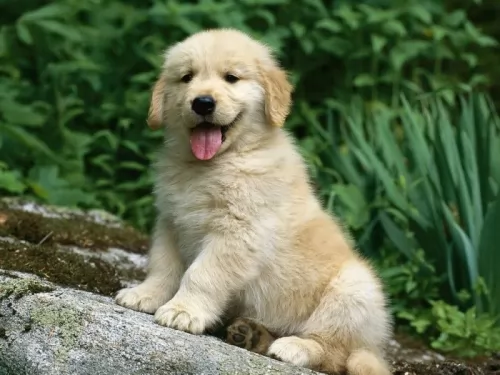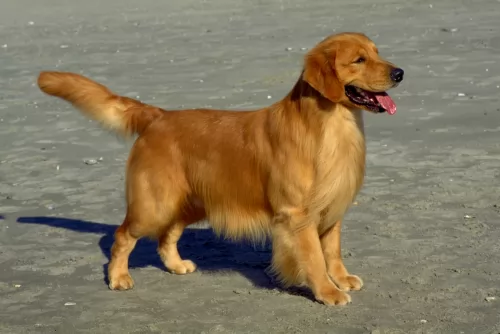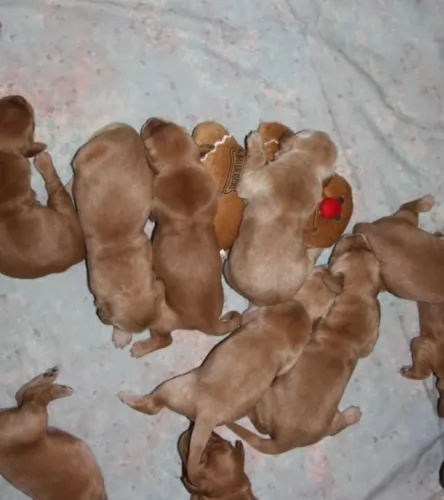 Petzlover
Petzlover Golden Retriever is originated from United Kingdom but Great Pyrenees is originated from France. Golden Retriever may grow 21 cm / 8 inches shorter than Great Pyrenees. Golden Retriever may weigh 18 kg / 39 pounds lesser than Great Pyrenees. Both Golden Retriever and Great Pyrenees has same life span. Both Golden Retriever and Great Pyrenees has almost same litter size. Both Golden Retriever and Great Pyrenees requires Moderate Maintenance.
Golden Retriever is originated from United Kingdom but Great Pyrenees is originated from France. Golden Retriever may grow 21 cm / 8 inches shorter than Great Pyrenees. Golden Retriever may weigh 18 kg / 39 pounds lesser than Great Pyrenees. Both Golden Retriever and Great Pyrenees has same life span. Both Golden Retriever and Great Pyrenees has almost same litter size. Both Golden Retriever and Great Pyrenees requires Moderate Maintenance.
 The Great Pyrenees could be from Spain or France because the dog hails from the Pyrenees Mountains, which spans both France and Spain.
The Great Pyrenees could be from Spain or France because the dog hails from the Pyrenees Mountains, which spans both France and Spain.
The dog was used to defend flocks from predators but its lineage goes a long way back, thousands of years in fact. It is thought that they only arrived in Europe about 5,000 years ago. The dog was adopted into the court of Louis the XIV as a royal dog.
During the mid 1600s, the dog's numbers dwindled but the French developed kennel clubs where the dog could be bred and its numbers restored. It was in 1933 that the Great Pyrenees received American Kennel Club recognition.
 The Golden retriever always gets in the top ten ranking in USA. They are very intelligent and beautiful. Also they are very active and they take more years to mature as they like being silly and playful. Up-to four years they seem to play like a puppy. As the breed is set in for hunting waterfowl and ducks, they need a regular exercise such as walking or running. They love to roam in the yard and run in the beach.
The Golden retriever always gets in the top ten ranking in USA. They are very intelligent and beautiful. Also they are very active and they take more years to mature as they like being silly and playful. Up-to four years they seem to play like a puppy. As the breed is set in for hunting waterfowl and ducks, they need a regular exercise such as walking or running. They love to roam in the yard and run in the beach.
They love to be always with his master and so it will be inside the home. They can be involved in doing regular home activities. Their characteristic is not to be a watchdog, as it barks when a stranger comes and after that they love to make friendship with him. They don't like to spend time alone and hence love to make new friends. When you think of buying a golden retriever puppy you should check whether the breeder is a reputable breeder.They must be well trained for a good result. When bringing it to many different areas they will gain more knowledge and intelligence. The nails can be trimmed at a regular interval which will be good for the foot of your dog.
 This is a beautiful dog, noticeable by the essentially white coat and his overall size, standing at 70 to 82cm and weighing between 40 to 54 kg.
This is a beautiful dog, noticeable by the essentially white coat and his overall size, standing at 70 to 82cm and weighing between 40 to 54 kg.
The double coat is medium to long, coarse and straight or wavy and and it can be solid white, cream or white with patches of light tan or grey.
The nose is black, the eyes brown, the ears of medium length and floppy and the tail long and plumed.
The Great Pyrenees is an intelligent, strong willed dog with a mind of his own so he will be able to be trained and socialized successfully.
His huge size will require that he be trained because when he is indoors he can knock things over and he must be able to respond to you telling him to lie down.
As a large dog, he isn’t suited for tiny homes, as he requires lots of space even though he doesn’t require a lot of exercise. Not only that, he takes his watchdog duties seriously and he is inclined to bark a lot, and in a small place, you’ll be getting constant complaints from the neighbors.
When trained and socialized, your big dog is social, active and loving. He gets on well with children, the elderly and with pets in the home. He isn’t that overly active and will happily make himself at home on your couch and bed.
 They love so much to play and spend time with children.
They love so much to play and spend time with children.
The Golden retriever has a good energy which helps them to be a great hunting dog.
They have a high sensitivity level and will enjoy moderate weather. They don't like apartment life as they love to roam freely and explore new areas.
They also have a high intelligence and so learns tricks very quickly. They love to hold something in mouth and run.
 The Great Pyrenees is such a calm, independent, serious, well-mannered dog who loves to be around his human family and to please them. He is gentle and knows how to behave well around children, the elderly as well as with any pets in the home.
The Great Pyrenees is such a calm, independent, serious, well-mannered dog who loves to be around his human family and to please them. He is gentle and knows how to behave well around children, the elderly as well as with any pets in the home.
He makes a wonderful companion and although he loves indoor life as much as outdoor life, he is much happier settling into life in the country or the suburbs as opposed to life in the city and a tiny property.
Give your big white coated pet all the love he thrives on, and you'll enjoy a wonderful relationship with this large, amicable dog.
 As the golden retriever gains weight very easily, they should not be overfed. They are prone to get cancer, hip dysplasia, heart problems, eye defects and skin allergies.
As the golden retriever gains weight very easily, they should not be overfed. They are prone to get cancer, hip dysplasia, heart problems, eye defects and skin allergies.
The golden retriever sheds hair profusely. The shedding can be reduced by brushing 3 times a week as it will remove the dead hair.Mild shampoo containing omega 3 and omega 6 fatty acids must be used so that it will prevent hair fall and provides healthy skin and fur. The hair can be trimmed but it should not be shaved as the pet will get problems during winter. Adding a drop of olive oil in the dog food will reduce shedding.
 Your Great Pyrenees is a big dog with an average lifespan of 10 to 12 years. His large size means you will need to look out for typical 'big dog' ailments such as hip dysplasia.
Your Great Pyrenees is a big dog with an average lifespan of 10 to 12 years. His large size means you will need to look out for typical 'big dog' ailments such as hip dysplasia.
This problem can cause your pet to be in pain and he can also become lame, battling to walk and play and battling to get up after lying down.
Also, look out for bone cancer with your pet and as mentioned previously, bloat, which is a life threatening disease where the stomach of the dog swells up.
 The puppy should be fed 3 times a day and it should be morning 7 and noon and evening within 6. They should not be fed after 6pm and should not be given water after 7pm as to make them a perfect watchdog. Peas, potatoes and flaxseed provide nutrition for them. Chicken fat is good for their skin. Chicory root and chelated minerals are good for their health.
The puppy should be fed 3 times a day and it should be morning 7 and noon and evening within 6. They should not be fed after 6pm and should not be given water after 7pm as to make them a perfect watchdog. Peas, potatoes and flaxseed provide nutrition for them. Chicken fat is good for their skin. Chicory root and chelated minerals are good for their health.
The Golden retriever can be fed by normal nutritious and proteins content food as they will gain much energy for them.
As the golden retriever has chances of getting bone problems they should not overfed.
They are having high energy levels and hence they require playing for 2 hours daily. The breed was set in for sporting and hunting and so it likes to play, run and jog.
 Your Great Pyrenees isn't going to be a dog leaping around you demanding a game or walk like what you get from some energetic dogs. He certainly doesn't require strenuous exercise but will require a nice, brisk walk every day. Give him some ball or rope games too. He's territorial and likes large grounds to walk around and guard and this constant guarding is a good form of exercise too.
Your Great Pyrenees isn't going to be a dog leaping around you demanding a game or walk like what you get from some energetic dogs. He certainly doesn't require strenuous exercise but will require a nice, brisk walk every day. Give him some ball or rope games too. He's territorial and likes large grounds to walk around and guard and this constant guarding is a good form of exercise too.
With two layers, the coat of the Great Pyrenees will need to be brushed twice a week to prevent burrs attaching to the fur and to prevent it from matting, It also gets rid of loose hair during shedding.
He tends to drool so it's handy keeping a damp cloth close by just to give his face area a wipe down. Your dog's ears will need to be cleaned with special ear-cleaning lotion and his nails will also need to be trimmed.
Socialize your Great Pyrenees with other dogs and people from a young age. Without proper socialization, this breed can become territorial and possessive of his family, which could lead to aggression. He bonds with his family but tends to be wary of strangers.
It is far better to feed your Great Pyrenees smaller meals throughout the day as opposed to 2 large meals a day. A large dog like him can develop bloat from gulping down a large amount of food too quickly.
If you feed your Great Pyrenees commercially manufactured food, make sure it is high in omega 3 and 6 to keep his thick white coat luxurious.
Your dog will need a dog food targeted at a large breed. Remember to include some raw meat as well as cooked chicken, vegetables and brown rice into his kibble and always ensure fresh, cool water is available.